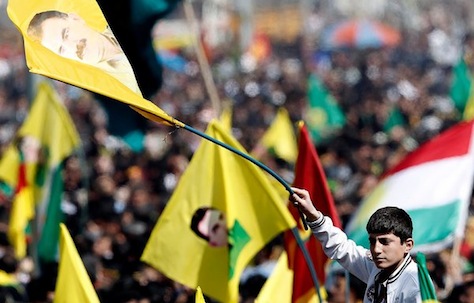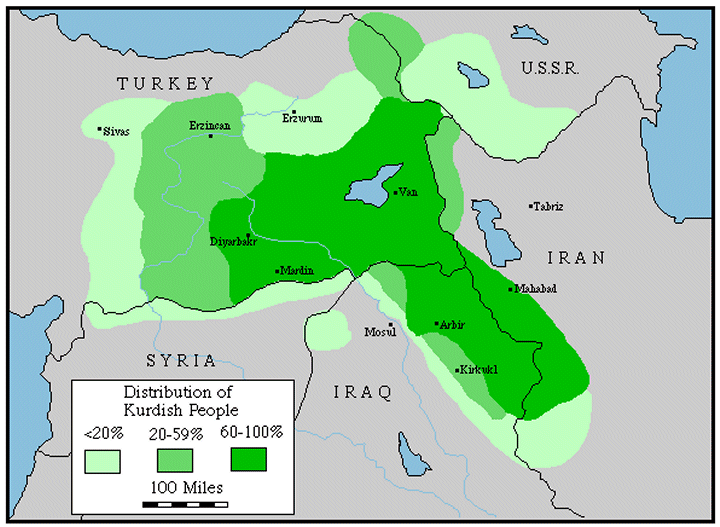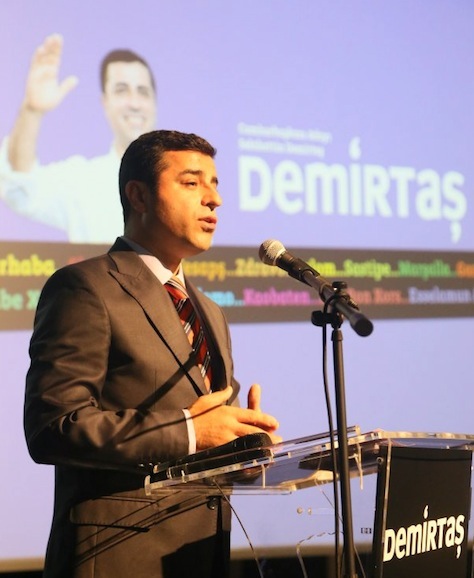After a century of being treated like second-class citizens in their own country, Turkish Kurds must wonder with astonishment how they have become increasingly in the span of less than a decade one of the most important swing groups in Turkish politics.![]()
When prime minister Recep Tayyip Erdoğan won Turkey’s first direct presidential election last week, he undoubtedly did so with the support of a significant portion of Turkey’s Kurdish population, which amounts to something between 15% and 25% of Turkey’s 76 million people.
Though Kurds are a ‘new’ ethnicity, in that a pan-Kurdish identity has only really emerged in the past century or so, the tribes to which the Kurds belong have existed for much longer, and they’ve always been impervious to central authority, whether it be the Ottoman sultan or a more modern leader.
About half of the world’s Kurds live in Turkey, and another quarter live in northern Iraq, which has increasingly become an autonomous region. That’s been much to the delight of Kurds, who marvel at a government for which Kurdish is the official language that graces the currency and legal documents. There’s a significant Kurdish population in Iran, and a handful of Kurds in Syria as well.
Since the earliest days of the Turkish republic, the country’s Kurdish ethnic minority has chafed at efforts by the central government in Ankara to exert its control, leading to several armed Kurdish revolts against the secular, Kemalist government in the 1920s and the 1930s, while Kurdish language and culture became officially and increasingly discouraged. A Kurd might leave behind the dusty, mountainous provinces of southeastern Turkey and succeed in Ankara or Istanbul, but largely by assimilating into the larger Turkish culture.
Conditions worsened in the 1980s with the rise of the Partiya Karkerên Kurdistan (PKK, Kurdistan Worker’s Party), founded in 1978 in as a Marxist revolutionary vehicle by Abdullah Öcalan. Despite the PKK’s leftist roots, Öcalan developed significant support among the Kurdish population, and he began to wage a guerrilla war against Turkish officials in and around Diyarbakır, the unofficial capital of the Kurdish-dominated southeast.
The escalation led to a counter-revolutionary push by the Turkish army that worsened Turkish-Kurd relations. By indiscriminately destroying villages, torturing and imprisoning Kurds and generally wreaking havoc, the military’s human rights and other abuses only pushed the Kurds closer to the PKK. Further restrictions imposed by Ankara on Kurdish culture and political organization gave the PKK an essential monopoly on Kurdish political opposition.
The Turkish government, in a secret nighttime raid in Nairobi, of all places, captured Öcalan in 1999, ending the worst of the two-decade uprising. Three years later, Erdoğan and the Islamist Adalet ve Kalkınma Partisi (AKP, the Justice and Development Party) came to power, ushering in a new era in what had been a republic whose secular character had for eight decades been ‘guaranteed’ by Turkish military force.
Erdoğan’s new approach meant a new way of thinking about Turkey’s Kurdish minority, too. As early as 2005, Erdoğan flew to Diyarbakır to deliver an address admitting the Turkish government’s past sins and promising that the Turkish government would do more in the future to ameliorate tensions. With words that now seem ironic, he committed Turkey to solving the Kurdish issue with ‘more democracy,’ at at a time when hope for Turkey’s accession into the European Union was running at its highest.
Notwithstanding Erdoğan’s rhetoric, the Kurdish issue remained nearly intractable for years. But most recently, events in the Middle East, notably in Syria and Iraq, have pushed Erdoğan closer to the Kurds. Erdoğan and the regional Kurdish government in northern Iraq have found in one other convenient allies, and Ankara now has smoother relations with Erbil than either Baghdad or Damascus. It’s not just the pipeline completed last year that will carry oil between Turkey and Iraqi Kurdistan, it’s a wide array of growing economic and political ties. By allowing those ties to flourish, Erdoğan has emboldened the Iraqi Kurdish regional government vis-à-vis Baghdad, even if Turkey remains firmly opposed to a fully independent Iraqi Kurdistan.
Even while Erdoğan’s urban and liberal critics protest his growing authoritarianism, Kurds have enjoyed a more relaxed political environment over the past decade. With Öcalan imprisoned and the PKK on the decline, a new generation of Kurdish political identity emerged that’s not interested in waging perpetual war against the Turkish government.
Last year, Erdoğan enacted a series of limited reforms designed to provide greater rights to the Kurdish minority — he lowered the threshold to enter the Turkish parliament from 10% to 5%, which will allow Kurdish parties to win greater seats. The reforms also permit the use of Kurdish-language teaching in private schools and allow Kurdish towns and cities to use their Kurdish, not Turkish, names.
After the PKK declared a ceasefire last year, following peace talks between the Turkish government and the still-imprisoned Öcalan, further legislation could provide for a wide amnesty of former PKK militants.
That’s all benefitting the relatively new Barış ve Demokrasi Partisi (BDP, Peace and Democracy Party), a Kurdish-interest, left-leaning party that won nearly 5% in the local elections last spring. Its presidential candidate, the 41-year-old Selahattin Demirtaş (pictured above) won 9.76% of the vote in last weekend’s election, winning many of the Kurdish-majority provinces in the southeast and attracting interest from among urban liberals as well. Though Demirtaş wasn’t expected to win the presidency, so winning 10% was something of a strong showing.
But the rest of the Kurdish population tilted heavily to Erdoğan and the AKP, not only because of Erdoğan’s efforts to pacify the Kurdish issue over the last decade, but because of long-held hostility to the two major opposition parties, the Cumhuriyet Halk Partisi (CHP, the Republican People’s Party), the heir to the old Kemalist political order that treated Kurds so horribly for decades, and the conservative Milliyetçi Hareket Partisi (MHP, Nationalist Movement Party), which embraces a Turkish nationalism that leaves many Kurds uncomfortable.
Had the race proceeded to an August 24 runoff, it’s vitally certain that a large majority of Kurds would have supported Erdoğan against the joint CHP-MHP candidate.
That makes Turkish Kurds a key swing vote for Erdoğan, and they have used their status to place more pressure on Erdoğan in the months leading up to the election.
What that means in the long run is more difficult to determine.
If, as expected, Erdoğan places an ally, such as foreign minister Ahmet Davutoğlu, as his successor as Turkish prime minister, Turkey’s Kurds, like everyone else, could chafe at Erdoğan’s ambitions to make Turkey a presidential state.
To do so, Erdoğan will need a two-thirds majority in the Turkish parliament following elections that must be held within the next 10 months. That means Erdoğan could be incredibly eager to seal a more permanent peace deal with Öcalan and the PKK, including a wide amnesty for former PKK fighters and broader Kurdish rights legislation — either in exchange for Kurdish votes or for the support of Demirtaş and his BDP bloc.
Top photo credit to Sedat Suna / European Pressphoto Agency.


